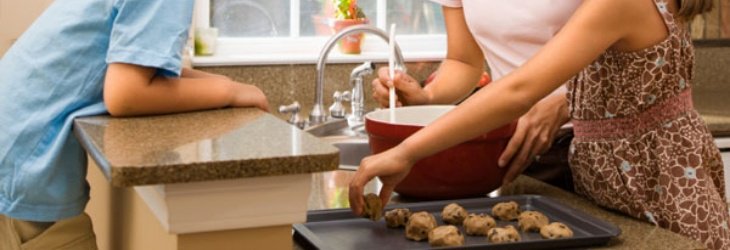The great George Bernard Shaw declared in Man & Superman, “There is no love sincerer than the love of food” and to build on Mr. Shaw’s sentiment, it’s commonly believed there’s no place more hazardous in the home than a poorly protected kitchen. For instance, most home fires start in the kitchen as do many other mishaps – and most cases of food poisoning definitely originate in the kitchen!
So, there are two key aspects to safety in the kitchen – those connected with food hygiene and those related to accident hazards, notably sharp and hot objects. And while many of the safety precautions you can take boil down to commonsense, the trouble is that in the heat of the moment, they’re easily overlooked.
4 golden rules can help eliminate many of those risks:
- Don’t allow anyone in the kitchen, apart from the chef, while cooking is under way.
- Point every blade and cooktop pan away from yourself.
- Wash hands (and dry on a paper towel) and utensils in hot soapy water at every stage of food handling/preparation.
- Return items (including leftovers) to the refrigerator as quickly as possible.
Of course, there are a lot more things you can and should do to make your kitchen a safer place for all. For specific recommendations, check out the subject on the website of the Home Safety Council. Plenty of other useful safety tips there as well.
But, with even with the best intentions, accidents do happen and in the kitchen, they tend to be of a more severe nature than perhaps anywhere else in the home. Fire is undoubtedly one of the biggest risks and the key thing to know is that if it’s a grease or oil fire, DON’T put water (or use a water-based extinguisher) on it. If you can, place a lid or cookie sheet on the pot (and leave it there) and/or spray it with a dry chemical fire extinguisher, in both cases switching off the heat if possible. If these solutions are unavailable to you or it’s not doused in half a minute, call 911.
If clothes catch fire, follow the Home Safety Council’s “Stop, Drop, Roll and Cool” advice: drop quickly to the floor, bring your hands over your chest and roll back and forth to extinguish the flames. With minor burns and scalds, cool the area under running water, then cover gently with a sterile dressing. Don’t use lotions and don’t touch the injury. If in doubt, seek medical help.
Dealing with the other kitchen related hazard – food poisoning – depends on the severity of the upset. Mild cases will clear up by themselves after a couple of days – just drink plenty of clear, still liquids. If the victim is a child or symptoms are severe, again seek medical advice.
Your kitchen should be a source of pleasure and enjoyment. A few simple steps will ensure it stays that way. And if things do go wrong try to keep your cool so you can take appropriate action but please don’t think you can cope when you can’t. Call in the experts.
